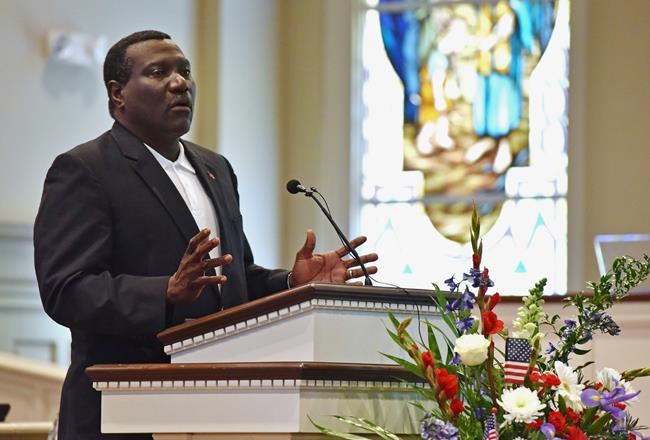Elevate your local knowledge
Sign up for the iNFOnews newsletter today!
Sign up for the iNFOnews newsletter today!
Selecting your primary region ensures you get the stories that matter to you first.

JACKSON, Miss. – The search for courtroom justice has ended in the 1964 “Freedom Summer” killings of three civil rights workers in Mississippi’s Neshoba County, but more than a half century after they died some Mississippians and the relatives of the slain men say the search for another kind of justice continues.
Mississippi Attorney General Jim Hood announced last week there’s no longer any way to gather enough evidence to charge any remaining suspects in the slayings of James Chaney, Andrew Goodman and Michael Schwerner.
His announcement marks a turning point. The three men, barely adults when a group of Ku Klux Klansmen killed them June 21, 1964, would be past retirement age today. Those who knew them or who lived then in Neshoba County are aging. For many, the 1988 movie “Mississippi Burning” may be their only knowledge of the case.
Few close to the case say they were surprised that Hood said no more prosecutions were possible, citing elderly and unco-operative witnesses and lost records.
“With knowledge of the case and knowledge of those who were involved, I think it was a reasonable choice to do so,” said Philadelphia Mayor James Young, the Neshoba County seat’s first African-American mayor. “The grave can only give so much information.”
But relatives of Chaney, Goodman and Schwerner, as well as Mississippians who have sought further prosecutions for more than 25 years, say the search for a justice that brings social healing still goes on.
“The whole issue of reconciliation and redemption is a battle that will go on for decades,” said Dick Molpus, a Philadelphia native and former Mississippi Secretary of State. In a watershed speech at the 25th anniversary of the deaths in 1989, Molpus apologized on behalf of the community.
Chaney, Goodman and Schwerner disappeared after venturing into Neshoba County to investigate the burning of Mt. Zion United Methodist Church and the beating of its African-American members. The three men’s bodies were found weeks later in an earthen dam. After an FBI investigation, eight people were convicted in 1967 of federal civil rights violations related to the killings.
The final prosecution came in 2005, when Hood and the Neshoba County district attorney won three manslaughter convictions against white supremacist Edgar Ray Killen. He remains in prison.
David Goodman, Andrew Goodman’s brother, said it’s still important to recognize what happened and analyze it, even if that leads to uncomfortable conclusions. Goodman says the tension between civic ideals and the racism that led to his brother’s murder remains present in American life.
“It’s like life in general,” said Goodman, who lives in New Jersey. “You have these great ideals and then everyday practices that arguably could be viewed as the exact opposite.”
Goodman and Rita Bender, Schwerner’s widow and a Seattle resident, say it’s wrong to focus only on the Klansmen involved in the killings, or even on Neshoba County. They say a society-wide reckoning with racism is still needed.
Mississippi, by some measures, has made significant progress. A state where blacks once faced violence for trying to vote now has hundreds of black elected officials. Yet its electorate remains racially polarized.
Prominent groups are trying to promote racial reconciliation. One is Mission Mississippi, a faith-based effort that encourages people to build deeper relationships across racial lines.
“Let’s deal with it in a way that will turn it into a positive for the whole society,” said Mission Mississippi President Neddie Winters. “How do we learn how to trust each other? How can we move past the issues that divide us?”
Susan Glisson is executive director of the William Winter Institute for Racial Reconciliation at the University of Mississippi. The group has worked with people in Philadelphia and elsewhere to examine histories of anti-black violence. While legal punishment may no longer be possible, Glisson said restorative justice still is. That approach tries to repair harm through a co-operative process involving victims, offenders and community members.
“I do think there’s a different culture now, of reaching out to create relationships, instead of not talking about those issues or actively avoiding those issues,” Glisson said.
A 2006 Mississippi law required schools to teach about civil rights. And a museum devoted to the civil rights struggle is supposed to open next year, adjacent to a broader state history museum.
In Neshoba County, some energy from the Philadelphia Coalition, the group of residents who publicly sought prosecutions, has shifted to the next generation. Leroy Clemons, an original coalition member, now leads the Neshoba Youth Coalition.
“Today, if you come into Philadelphia, the children can tell you the story,” he said.
Clemons, like others, says he thinks some of the work building relationships has borne fruit in Philadelphia.
“The progress in our community was never tied to whether that case was open or not,” he said.
___
Follow Jeff Amy at: http://twitter.com/jeffamy . Read his work at http://bigstory.ap.org/author/jeff-amy
This site is protected by reCAPTCHA and the Google Privacy Policy and Terms of Service apply.
Want to share your thoughts, add context, or connect with others in your community?
You must be logged in to post a comment.